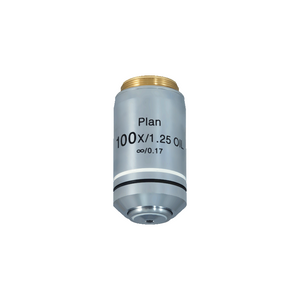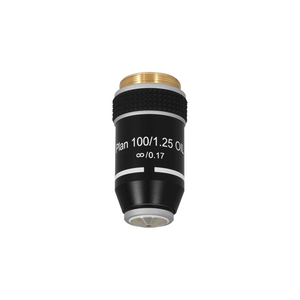PL04053831 100X Infinity Plan Achromatic Polarizing Objective
Technical Info
Instructions
ObjectiveClose Λ
| The objective (lens) is the first set of optical systems that image the object being observed, and is also the most important imaging component in the microscope. Depending on the application, objective is usually classified into the following categories: Biological Objective Metallurgical Objective Phase Contrast Objective Polarizing Objective Dark/Bright Field Objective Stereo Objective Monocular Video Microscope Objective Infinity-Corrected Long Working Distance Objective NIR Objective NUV Objective UV Objective Telecentric Objective Lens Some objectives are mounted directly on the microscope body, some separate from the body and are installed when needed. Different types of microscope objectives are generally not interchangeable. However, when ofthe same type and parameter design the same or similar, the objectives of different models and manufacturers are interchangeable, provided that attention shouldbe paid to the change in magnification, working distance, field of view and image quality. Usually, on the objective outer casing, there are signs of the following parameters: Objective Magnification: for example 10X, 40X Numerical Aperture (N.A.): for example, /1.30 Objective Immersion Media: Oil represents oil, W represents water, and Glyc represents glycerin Mechanical Tube Length and Objective Cover Glass Thickness: the two parameters are usually written together and separated by /. The finite mechanical is usually 160, 195, etc., and infinite is represented by "∞"; objective cover glass thickness (thickness / mm) is expressed after/, for example /0.17; for specimen that does not use objective cover glass, it is represented by 0, for example, "/0"; for those that do not use objective cover glass or the objective cover glass thickness is smaller than 0.17, it is represented by "/-". Phase Contrast Objective: represented by PH, for example, PH2, the digit after PH represents the associated ring diaphragm. Polarizing Objective: represented by POL. Plan Objective: represented by PLAN or PL Achromatic: generally, achromatic objective does not require identification Apochromatic: represented by APO Long Working Distance: represented by L There are also objectives that are unique in magnification and medium, and their difference is indicated by color circle. For objectives that do not have mark, it is necessary to refer to the microscope body for judgment, or refer to the product manual. Usually, the objective has very fine mounting threads. When there is a need to install the objective /objective frame, be careful to install it. Align the nosepiece installation position, keep it completely “flat”. When it is blocked, remove it and reinstall it. Do not force it in. Note: although between different manufacturers, some objectives can be used universally, they may still bring magnification error and image quality degradation. |









